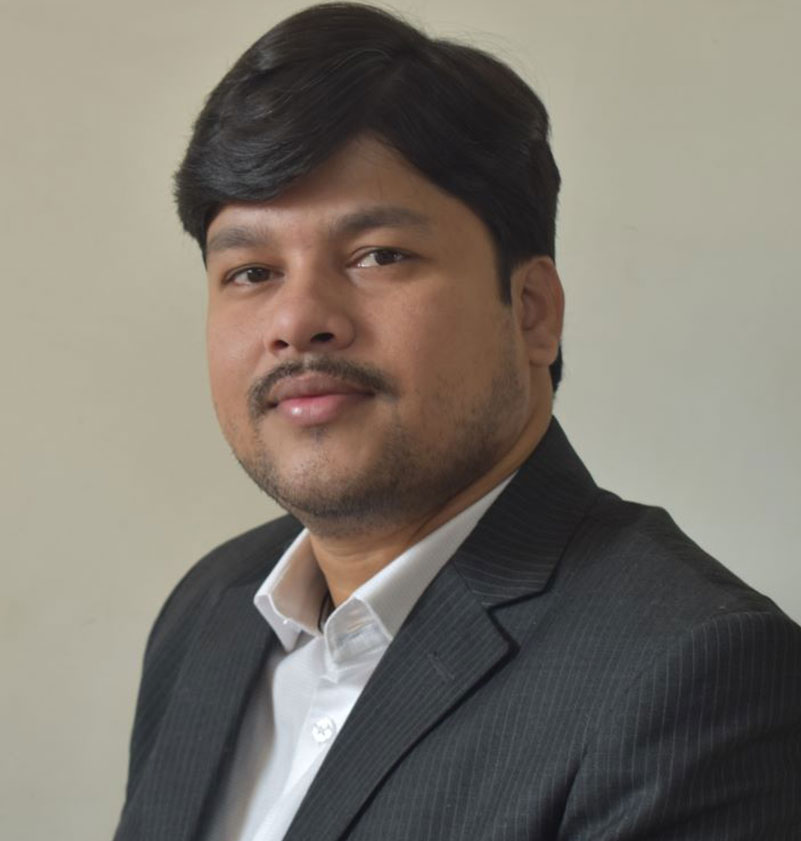I teach the following courses:
1. General Chemistry : A theory course for the undergraduate students which includes quantum theory, atomic structure and spectra, VB- and MO-theory, thermodynamics, chemical kinetics, UV-, IR-, and NMR-spectroscopy, conformational analysis of organic molecules (cyclic and acyclic), stereochemistry, substitution and elimination reactions, nucleophilic addition to C-C multiple bonds, aromaticity, coordination chemistry
2. Chemistry Laboratory : A practical course for the undergraduate (1st year) students which includes several laboratory experiments of physical, organic and inorganic chemistry.
3. Environmental Studies: A theory course for the undergraduate (1st year) students which includes the concepts of ecosystems, biodiversity, natural resources, environmental pollution etc.
4. Organic Chemistry II : A theory course for M.Sc. chemistry (Hons.) students which includes stereochemistry, reaction mechanism (substitution and elimination), pericyclic reactions and asymmetric synthesis.
5. Organic Chemistry III : A theory course for M.Sc. chemistry (Hons.) students which includes important reagents and reactions in organic synthesis, disconnection approach (one group C-X and C-C disconnections, two group C-X and C-C disconnections) in organic synthesis (retrosynthetic analysis), synthetic strategies for important heterocyclic and heteroaromatic compounds, transition-metal catalyzed C-C bond forming reactions (Suzuki, Heck, Hiyama, Negishi, Sonogashira, Stille cross-coupling reaction), C-N bond forming reactions (Buchwald-Hartwig reaction)
6. Organic Chemistry IV : A theory course for M.Sc. chemistry (Hons.) students which includes synthesis, physical properties and reactions of amino acids, protein/polypeptide sequence analysis, structural features and synthesis and also heterocyclic chemistry including preparation, properties and reactions of three, four, five and six membered heterocycles and fused heteroaromatics.
7. Frontiers in Organic Chemistry : An elective course for M. Sc. Chemistry (Hons.) students which includes strategy and control to achieve chemo-, regio- and stereoselective organic synthesis, cross-coupling reactions, metal-catalyzed carbocyclization, direct functionalization of olefins, radical chemistry, metal-free catalysis, tandem reactions
8. Chemical Experimentation Laboratory-I : A practical course for the M.Sc. chemistry (Hons.) students which includes detection of special elements (nitrogen, sulfur and halogens) and functional groups in an organic sample, synthesis of various class of important organic molecules, monitoring the progress of an organic reaction by thin layer chromatography (TLC), separation of different type (acidic and basic) of organic compounds by simple basic or acidic aqueous work up with organic solvent, separation and isolation of organic compounds from a mixture by column chromatography, natural product isolation.
9. Advanced Organic Chemistry : A theory course for the Ph.D. students which includes aromatic electrophilic and nucleophilic substitution, nucleophilic addition to C-C and C-X (X = heteroatom) multiple bonds, oxidation and reduction reactions, retrosynthetic analysis and protecting groups, enolates in organic synthesis and multistep synthesis
10. Heterocyclic Chemistry : A theory course for the Ph.D. students which includes nomenclature of heterocyclic molecules, chemistry of three and four membered heterocycles, reactivity of aromatic heterocycles, synthesis and reactions of various five- and six-membered heterocyclic molecules such as furan, thiophene, pyrrole, imidazole, thiazole, oxazole, indole, benzofuran, pyridine, quinolone, and isoquinoline, and synthesis of selected heterocyclic natural products and drug molecules
11. Physical Methods in Chemistry : A theory course for the Ph.D. students which describes the principles and practice of modern instrumental methods for chemical analysis. This course includes various spectroscopic techniques such as UV-Visible, Infrared, XPS, XRF, NMR (1H, 13C and other elements, NOE, correlation spectroscopies), ESR, CD, Mass spectroscopy, atomic absorption and emission spectroscopies, fluorescence spectroscopy and microscopy and chromatographic techniques such as GC/HPLC. Other topics include electroanalytical methods, thermal analysis, Mossbauer spectroscopy and diffraction methods like SCXRD and PXRD










